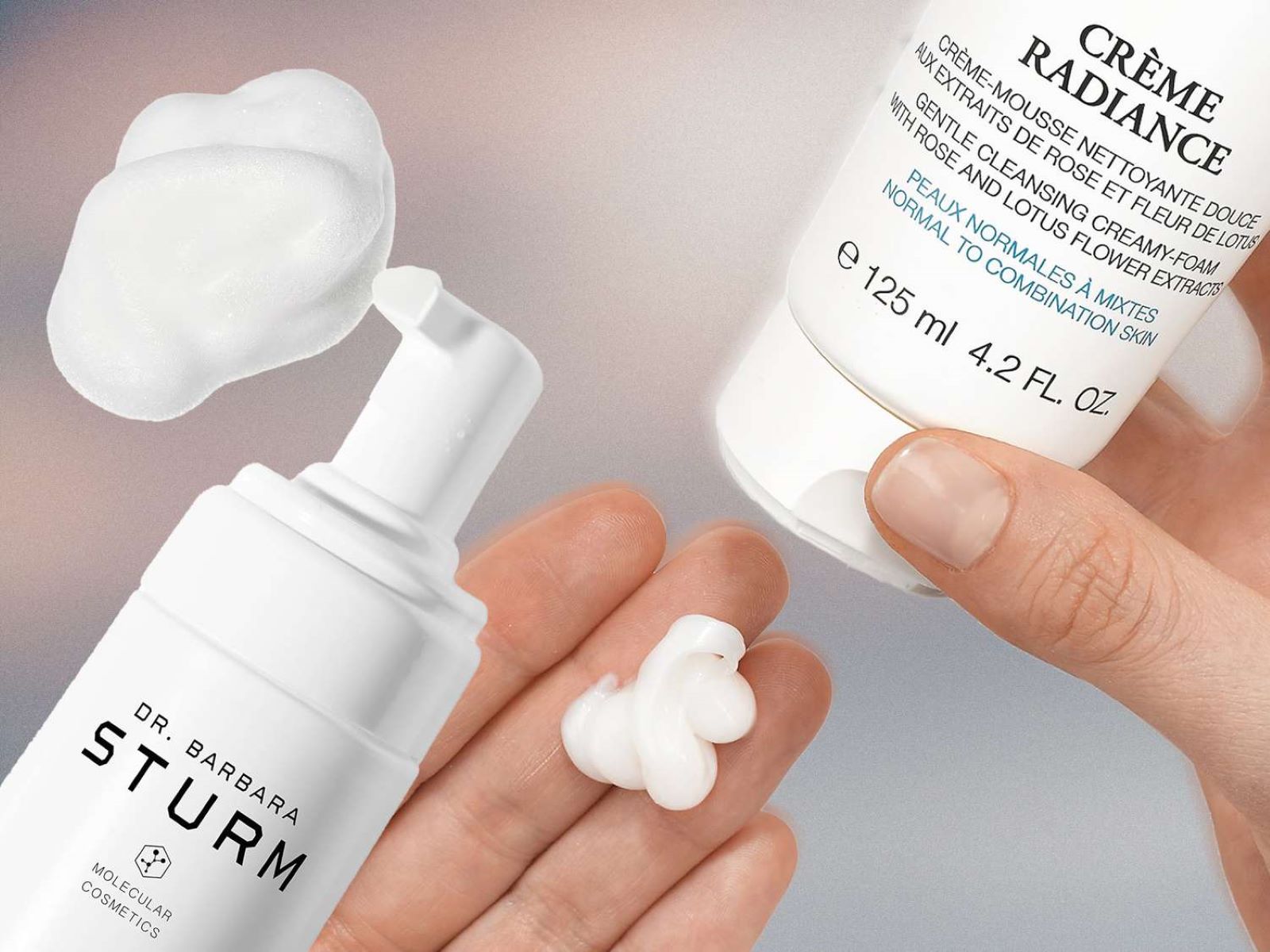Home>Health and Wellness>The Surprising Difference Between Foaming And Non-Foaming Cleansers


Health and Wellness
The Surprising Difference Between Foaming And Non-Foaming Cleansers
Published: February 6, 2024
Discover the best cleanser for your skin type. Learn about the benefits of foaming and non-foaming cleansers for your health and wellness routine.
(Many of the links in this article redirect to a specific reviewed product. Your purchase of these products through affiliate links helps to generate commission for Regretless.com, at no extra cost. Learn more)
Table of Contents
Introduction
Choosing the right cleanser is a crucial step in any skincare routine. With an array of options available, it's easy to feel overwhelmed by the choices. Foaming and non-foaming cleansers are two popular categories, each offering unique benefits. Understanding the differences between these cleansers is essential for making an informed decision about which one is best suited for your skin.
Foaming and non-foaming cleansers vary in their formulations and the way they interact with the skin. By delving into the science behind these cleansers and exploring their respective benefits and drawbacks, you can gain valuable insights into how they can impact your skincare regimen. Whether you're aiming for a refreshing cleanse or seeking a gentle, hydrating solution, the distinction between foaming and non-foaming cleansers holds the key to achieving your desired skincare results.
In the following sections, we will explore the characteristics of foaming and non-foaming cleansers, uncover the science behind their formulations, and weigh the pros and cons of each type. By the end of this article, you'll be equipped with the knowledge to determine which cleanser aligns best with your skin's unique needs. So, let's embark on this enlightening journey to unravel the surprising disparity between foaming and non-foaming cleansers.
What are Foaming Cleansers?
Foaming cleansers, as the name suggests, are skincare products that produce a rich lather when mixed with water. This lathering effect is often associated with a thorough cleansing experience, making foaming cleansers popular among individuals with oily or combination skin types. These cleansers typically contain surfactants, which are compounds that lower the surface tension between oil and water, enabling the formation of bubbles and foam.
The primary function of foaming cleansers is to remove impurities, excess oil, and makeup from the skin's surface. The foaming action aids in lifting away dirt and debris, leaving the skin feeling refreshed and rejuvenated. Many foaming cleansers also contain ingredients such as glycerin and hyaluronic acid to help maintain the skin's moisture balance, preventing it from feeling stripped or dry after cleansing.
Foaming cleansers are often recommended for individuals who prefer a deep-cleansing sensation or those who struggle with excess sebum production. The invigorating lather can provide a sense of purification, making it an appealing choice for those who enjoy a thorough cleansing ritual.
However, it's important to note that some foaming cleansers may contain harsh surfactants that can potentially disrupt the skin's natural barrier, leading to dryness or irritation, especially for individuals with sensitive or dry skin. Therefore, selecting a gentle foaming cleanser formulated with mild surfactants and nourishing ingredients is crucial for maintaining skin health while enjoying the benefits of a refreshing cleanse.
In essence, foaming cleansers offer a deep-cleansing experience, effectively removing impurities and excess oil from the skin's surface. When chosen thoughtfully, these cleansers can provide a revitalizing and purifying skincare routine, catering to the needs of those seeking a thorough yet gentle cleansing solution.
What are Non-Foaming Cleansers?
Non-foaming cleansers, also known as non-lathering or cream cleansers, offer a gentle and hydrating approach to cleansing the skin. Unlike foaming cleansers that produce a rich lather, non-foaming cleansers maintain a creamy or milky consistency when mixed with water. These cleansers are formulated to effectively cleanse the skin without stripping away its natural oils, making them suitable for individuals with dry, sensitive, or mature skin types.
The key distinguishing feature of non-foaming cleansers lies in their composition. They are often enriched with emollients, humectants, and soothing ingredients such as aloe vera, chamomile, and natural oils like jojoba or avocado oil. These nourishing components help to gently remove impurities and makeup while simultaneously providing hydration and comfort to the skin.
Non-foaming cleansers are particularly beneficial for individuals seeking a mild and non-stripping cleansing experience. The absence of a rich lather does not compromise their ability to effectively cleanse the skin, making them an ideal choice for those with delicate or reactive skin. The creamy texture of these cleansers offers a luxurious sensation during application, contributing to a soothing and pampering skincare ritual.
Moreover, non-foaming cleansers are well-suited for individuals with conditions such as eczema or rosacea, as they are less likely to exacerbate sensitivity or irritation. The gentle nature of these cleansers makes them conducive to maintaining the skin's moisture balance, preventing dryness and promoting a supple, nourished complexion.
While non-foaming cleansers excel in providing a gentle and hydrating cleanse, it's essential to note that they may not offer the same deep-cleansing sensation as foaming cleansers, especially for individuals with very oily skin. However, the trade-off for a more nurturing cleansing experience often outweighs the need for intense oil removal, making non-foaming cleansers a preferred choice for those prioritizing skin comfort and hydration.
In essence, non-foaming cleansers cater to the needs of individuals seeking a mild, nourishing, and non-stripping cleansing experience. Their creamy texture and skin-loving ingredients make them a valuable addition to skincare routines, particularly for those with dry, sensitive, or mature skin, offering a gentle yet effective approach to maintaining skin health and vitality.
The Science Behind Foaming and Non-Foaming Cleansers
The distinction between foaming and non-foaming cleansers extends beyond their visual and textural variances, delving into the intricate science of their formulations and interactions with the skin. Understanding the underlying principles behind these cleansers sheds light on their cleansing mechanisms and how they cater to diverse skin needs.
Foaming Cleansers:
The foaming action in cleansers is primarily attributed to the presence of surfactants, which are amphiphilic compounds capable of reducing the surface tension between oil and water. Surfactants consist of hydrophilic (water-attracting) and lipophilic (oil-attracting) components, enabling them to bind with both oil and water molecules. When a foaming cleanser is mixed with water and agitated, the surfactants work to encapsulate oil and dirt, allowing them to be easily rinsed away in the form of foam and bubbles. This process facilitates the removal of impurities and excess sebum from the skin's surface, imparting a sensation of cleanliness and freshness.
The surfactants in foaming cleansers play a pivotal role in emulsifying oils and suspending debris, making them effective for individuals with oilier skin types. However, some foaming cleansers may contain harsh surfactants, such as sodium lauryl sulfate (SLS), which can potentially disrupt the skin's natural lipid barrier, leading to dryness and irritation, particularly for those with sensitive or dry skin.
Non-Foaming Cleansers:
Non-foaming cleansers, in contrast, are formulated with milder surfactants or nonionic cleansing agents that do not produce a rich lather. Instead, they rely on the combination of emollients, humectants, and gentle cleansing agents to remove impurities while maintaining the skin's moisture balance. Emollients, such as natural oils and fatty acids, help to soften and lubricate the skin, while humectants, like glycerin and hyaluronic acid, attract and retain moisture, contributing to a hydrated and supple complexion.
The absence of a foaming action in non-foaming cleansers does not compromise their efficacy in cleansing the skin. Instead, their focus lies in providing a soothing and nurturing cleansing experience, making them suitable for individuals with dry, sensitive, or mature skin. The gentle nature of non-foaming cleansers minimizes the risk of disrupting the skin's natural barrier, promoting comfort and hydration during the cleansing process.
By comprehending the scientific underpinnings of foaming and non-foaming cleansers, individuals can make informed decisions based on their skin type and specific concerns. Whether seeking a deep-cleansing sensation or a gentle, hydrating cleanse, understanding the science behind these cleansers empowers individuals to tailor their skincare regimen to meet their unique needs.
Benefits and Drawbacks of Foaming Cleansers
Foaming cleansers offer several benefits that cater to the needs of those seeking a deep-cleansing experience. The rich lather produced by these cleansers effectively lifts away impurities, excess oil, and makeup from the skin's surface, leaving it feeling refreshed and revitalized. This thorough cleansing action can be particularly beneficial for individuals with oily or combination skin types, as it helps to mitigate the effects of excess sebum production and imparts a sense of purification.
Moreover, many foaming cleansers are formulated with ingredients such as glycerin and hyaluronic acid, which aid in maintaining the skin's moisture balance. This ensures that the skin does not feel stripped or dehydrated after cleansing, striking a balance between deep cleansing and hydration.
However, it's important to consider the potential drawbacks of foaming cleansers. Some products in this category may contain harsh surfactants, such as sodium lauryl sulfate (SLS), which can compromise the skin's natural lipid barrier. This can lead to dryness, irritation, and a feeling of tightness, especially for individuals with sensitive or dry skin. It's crucial to select a foaming cleanser formulated with mild surfactants and nourishing ingredients to avoid these adverse effects and maintain skin health.
In summary, the benefits of foaming cleansers lie in their ability to provide a thorough and invigorating cleansing experience, effectively removing impurities and excess oil while maintaining the skin's moisture balance. However, it's essential to be mindful of potential drawbacks, particularly related to the presence of harsh surfactants, and select a gentle foaming cleanser that aligns with the specific needs of your skin.
Benefits and Drawbacks of Non-Foaming Cleansers
Non-foaming cleansers, also known as cream or lotion cleansers, offer a range of benefits that cater to individuals seeking a gentle and hydrating cleansing experience. The creamy texture and nourishing formulation of non-foaming cleansers make them particularly well-suited for individuals with dry, sensitive, or mature skin types. One of the primary advantages of non-foaming cleansers is their ability to effectively cleanse the skin without stripping away its natural oils. This gentle approach to cleansing helps maintain the skin's moisture balance, preventing dryness and promoting a supple, nourished complexion.
The presence of emollients, humectants, and soothing ingredients in non-foaming cleansers contributes to their hydrating properties. Emollients, such as natural oils and fatty acids, work to soften and lubricate the skin, enhancing its overall texture and appearance. Meanwhile, humectants like glycerin and hyaluronic acid attract and retain moisture, imparting a lasting hydration that leaves the skin feeling refreshed and rejuvenated. This makes non-foaming cleansers an ideal choice for individuals seeking a mild yet effective cleansing solution that prioritizes skin comfort and hydration.
Furthermore, non-foaming cleansers are often favored by those with sensitive or reactive skin, as their gentle nature minimizes the risk of irritation or exacerbating existing skin conditions. The absence of a rich lather does not compromise the efficacy of non-foaming cleansers in removing impurities and makeup, making them a reliable option for individuals with delicate skin concerns. The soothing and nurturing properties of non-foaming cleansers contribute to a calming and pampering skincare ritual, enhancing the overall experience of cleansing while promoting skin health and vitality.
Despite their numerous benefits, it's important to acknowledge the potential drawbacks of non-foaming cleansers. While these cleansers excel in providing a gentle and hydrating cleanse, they may not offer the same deep-cleansing sensation as foaming cleansers, particularly for individuals with very oily skin. The trade-off for a more nurturing cleansing experience often involves a lesser emphasis on intense oil removal. Therefore, individuals with specific concerns related to excess sebum production may find that non-foaming cleansers do not fully address their needs.
In essence, the benefits of non-foaming cleansers lie in their ability to deliver a mild, nourishing, and non-stripping cleansing experience, making them a valuable addition to skincare routines, particularly for those with dry, sensitive, or mature skin. However, it's essential to consider the potential trade-offs and select a cleanser that aligns with the specific needs and preferences of your skin.
Which Cleanser is Right for You?
When determining which cleanser is best suited for your skincare routine, it's essential to consider your skin type, specific concerns, and desired cleansing experience. Foaming cleansers are ideal for individuals with oily or combination skin, as they offer a deep-cleansing sensation and effectively mitigate the effects of excess sebum production. The rich lather produced by foaming cleansers lifts away impurities and excess oil, leaving the skin feeling refreshed and revitalized. However, it's crucial to select a gentle foaming cleanser formulated with mild surfactants and nourishing ingredients to avoid potential dryness or irritation, especially for those with sensitive skin.
On the other hand, non-foaming cleansers are well-suited for individuals with dry, sensitive, or mature skin types. The creamy texture and nourishing formulation of non-foaming cleansers provide a gentle and hydrating cleansing experience, effectively removing impurities while maintaining the skin's moisture balance. These cleansers are enriched with emollients, humectants, and soothing ingredients, making them conducive to preventing dryness and promoting a supple, nourished complexion. If you prioritize skin comfort and hydration, non-foaming cleansers offer a soothing and nurturing cleansing solution.
When making your decision, it's essential to assess your skin's unique needs and preferences. If you seek a thorough and invigorating cleanse, a gentle foaming cleanser with hydrating properties may be the right choice. Alternatively, if you prioritize a mild and non-stripping cleansing experience that focuses on hydration and comfort, a non-foaming cleanser enriched with skin-loving ingredients may align better with your skincare goals.
Ultimately, the choice between foaming and non-foaming cleansers hinges on understanding your skin's requirements and selecting a cleanser that complements your specific concerns. By evaluating the benefits and potential drawbacks of each type of cleanser in relation to your skin type and preferences, you can make an informed decision that enhances your skincare routine and promotes a healthy, radiant complexion.
Read more: The Surprising Difference Between Ser And Ir
Conclusion
In conclusion, the choice between foaming and non-foaming cleansers plays a pivotal role in tailoring a skincare routine to meet the unique needs of individuals. Both types of cleansers offer distinct benefits and cater to specific skin concerns, providing a diverse range of cleansing experiences. Understanding the characteristics, science, and potential trade-offs of foaming and non-foaming cleansers empowers individuals to make informed decisions that align with their skin type, preferences, and desired skincare outcomes.
Foaming cleansers, with their ability to provide a deep-cleansing sensation and effectively lift away impurities and excess oil, are well-suited for individuals with oily or combination skin. The invigorating lather produced by foaming cleansers imparts a sense of purification, making them an appealing choice for those seeking a refreshing and revitalizing cleansing experience. However, it's crucial to select a gentle foaming cleanser formulated with mild surfactants and nourishing ingredients to avoid potential dryness or irritation, especially for those with sensitive skin.
On the other hand, non-foaming cleansers offer a gentle and hydrating approach to cleansing, making them particularly beneficial for individuals with dry, sensitive, or mature skin. The creamy texture and nourishing formulation of non-foaming cleansers prioritize skin comfort and hydration, effectively removing impurities while maintaining the skin's moisture balance. The soothing and nurturing properties of non-foaming cleansers contribute to a calming and pampering skincare ritual, enhancing the overall experience of cleansing while promoting skin health and vitality.
Ultimately, the decision between foaming and non-foaming cleansers hinges on an individual's skin type, specific concerns, and desired cleansing experience. By carefully evaluating the benefits and potential drawbacks of each type of cleanser and considering their impact on the skin, individuals can select a cleanser that complements their skincare goals. Whether seeking a thorough and invigorating cleanse or prioritizing a mild and non-stripping cleansing experience focused on hydration and comfort, the distinction between foaming and non-foaming cleansers guides individuals toward an informed choice that enhances their skincare regimen and promotes a healthy, radiant complexion.













